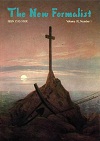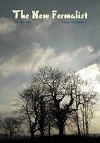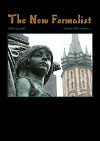Ezra Pound Enters the Tent
No, this is not a station in the metro,
this is an open cage outside of Pisa.
Ezra Pound now sits inside of it,
his beard a burning bush of grief made new.
Gazing at the moon, and looking retro,
the better craftsman grins to bars, and sees a
night of stars implode, his touched eyes lit
and posed for labour. If not he, then who
will scribble truth into a timeless croon?
Twenty-five days will pass before the good
guys offer him a tent, his face now wood,
his psyche worn by rain and sun and moon.
He leaves the cage, and is assisted in,
his mouth ajar, his grin not quite a grin.
first appeared in Contemporary Sonnet
After the Old Masters
The father looks up to the sky or ceiling
(beyond the grey scale of the photograph)
with his son wrapped inside his cradling arms.
An orderly obscures the boy’s midsection,
with silence says he is beyond all healing.
Outside the frame in colour copter strafe
restokes the ire of Taliban gendarmes
who soothe the mother twisted in dejection.
We do not catch a whiff of her pained retching,
catch sight of their clenched fists or hear their words.
We see the father’s sorrow-stricken eyes
in what could almost be a Rembrandt etching,
his pitch black pupils focused heavenwards
to where God’s justice or His mercy lies.
first appeared in Chronicles
The Condemned House
After a Black & White Photograph by Jared Carter
Who alive remembers who lived there
seventy years ago? A family
of WASPS set in their ways? The leafless tree
in front was just a sapling then. Despair
did not weigh heavy on the owner’s brow,
a man who paid his taxes, loved his wife,
and who in ‘44 gave up his life
for freedom. Who today cares or knows how?
And now the house is boarded up, its last
tenants peddlers of cheap crack cocaine,
its naked boards exposed to elements,
its roof’s tar-paper caught in the grey blast,
around it dirty snow, above it rain.
The photo knows itself what it laments.
first appeared in Chronicles
The Cat
I’d pass it on the mission trail—
half-decomposed, green burr-like eyes
beyond my thoughts or pity, tail
curled into questions only flies
would answer, as they staked their claim
to rotting tissue. Food for worms,
and mocked by summer’s honey flame,
it had no choice but come to terms
with piecemeal dissolution. Those
loud buzzes echoed in my ears
until it circled and then rose,
converting me—some thirty years
since—into the lone passerby
and witness, ever on my way
from daily service, like the sky
itself on resurrection day.
first appeared in Washington Literary Review
Passenger Pigeons
I’d lift my forehead from the book and see
a flock consisting of a billion birds,
like a river in the heavens, three
miles wide, and forty miles in length. My words
never pierced the shadow they cast down.
Born more than eighty years too late, I could
not warn them of the threat of each new town,
of hunters waiting in the underwood.
For hours they were sovereigns to my eyes,
passing over Mercer County. The sun
gilded their feathers in the bloody twilight,
and when they vanished over the horizon
towards Ohio, Michigan, and the night,
what I heard were not coos, only cries.
first appeared in Iambs & Trochees



